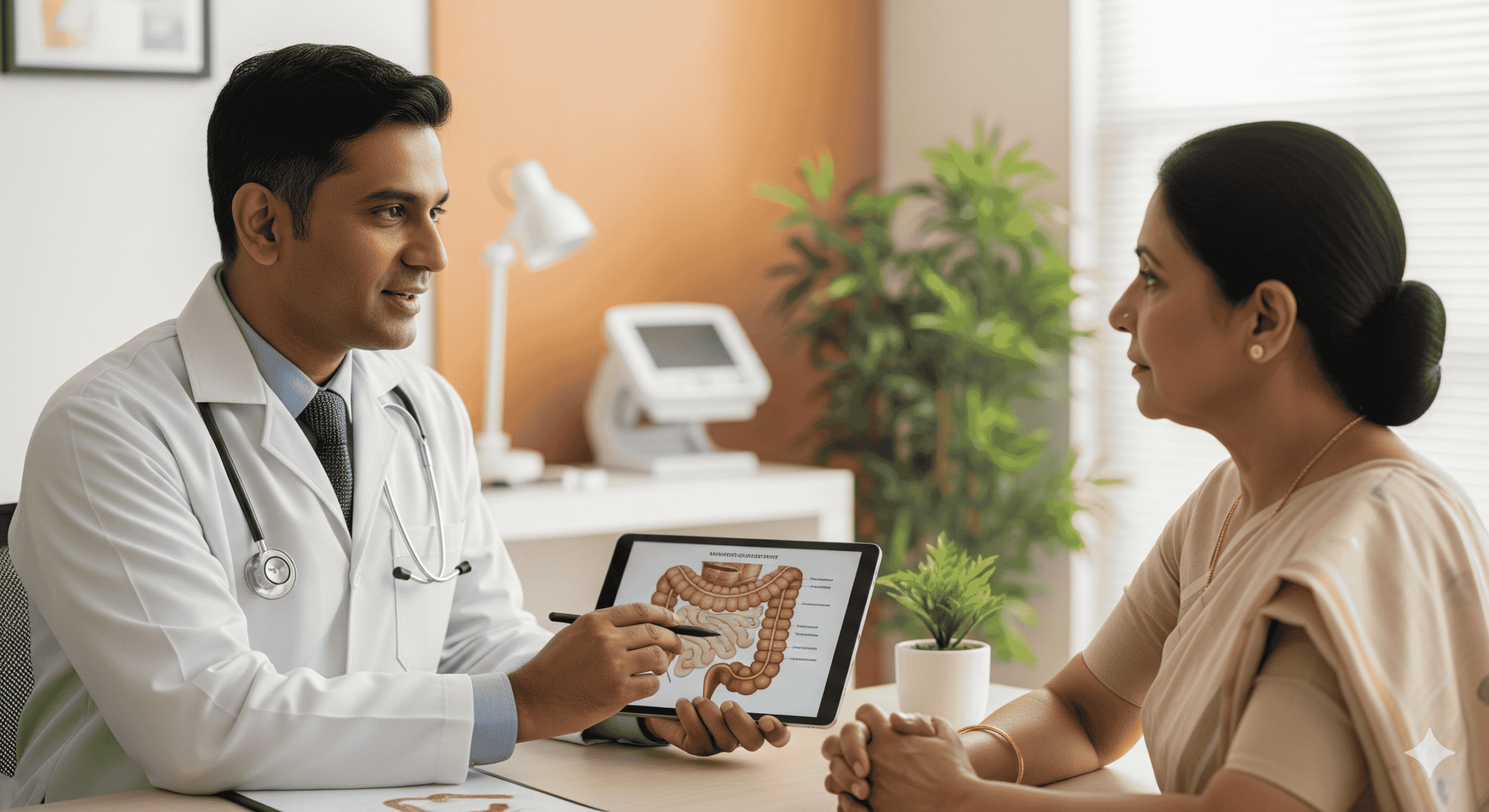Colorectal Surgery: Conditions, Treatments, and Recovery
The large intestine, contrary to its name, is actually much smaller in length when compared to the small intestine, which can span many feet in length. The large intestine is composed of different regions called the caecum, colon, rectum, the anus respectively. Colorectal conditions that can cause painful symptoms include fissures, fistula, haemorrhoids, polyps, cancer, congenital defects, Crohn’s disease, ulcerative colitis, etc., among many other possibilities. Colorectal surgery can greatly help in relieving symptoms, reducing pain and improving quality of life in the long term.
Types of Colorectal Surgery-
Let us look at the different types of colorectal surgery that are performed by Surgical Gastroenterologist proctologists, for various colorectal conditions. We have mentioned a few and not all of them, here.
- Colostomy- In this surgery, an opening is created in the abdomen, through which the colon is pulled and anchored into a bag is then attached to this end so that stool can be collected and removed periodically. This colostomy bag may be a permanent or temporary fixture, depending on the severity of your condition.
- Colectomy- A part or the whole colon is surgically removed, and then the 2 ends of the intestine are stitched back together. At times, if there is not much gut left to stitch together, the surgeon may connect the open end to an opening that will be made in the abdomen called a stoma.
- Anoplasty- The anus may need to be reconstructed if there is significant anal stenosis, and anoplasty can help a lot.
- Haemorrhoidectomy- The removal of haemorrhoids or swollen veins in the anus can be done using minimally invasive surgery, laser, open technique or stapler, etc. Haemorrhoid surgery is mostly minimally invasive.
- Laparoscopic colon surgery – Small incisions are made, and then a laparoscope is inserted into the abdomen to visualise the affected region of the gut. It is then surgically removed, and the ends are stitched back together. Since it is minimally invasive, there is less risk of suffering from complications afterwards.
- Lateral Internal Sphincterectomy- This is a surgical procedure that is done to provide relief from anal fissures. A small portion of the Internal Sphincter is surgically cut to help reduce muscle spasms and the severe pain that can occur along with it.
Minimally invasive colorectal surgery for cancer is a great advancement in this field, as smaller incisions and less bleeding can mean faster recovery. Specialised instruments are used to remove tumour tissue in the colon and rectum. But open surgery may be necessary in some cases. Colorectal cancer can be divided into stages, based on how severely the tumour has spread or based on its size and depending on the stage/ grading, open or laparoscopic surgery is advised.
- Partial or total Colectomy is one procedure that is done for colorectal cancer. The procedures which can be done, depending on the severity of your condition, may be as follows-
- Polypectomy- The removal of any colorectal polyps by colonoscopy. You heal quickly, as it is a minor procedure.
- Partial or total Proctectomy- Part or whole of the rectum is removed in this complicated surgical procedure. A colostomy bag may be used for stool collection.
Also, the use of specific chemotherapeutic agents is routinely used along with surgical intervention, with pre or post-surgery
Some common complications that you will need to know include-
- Bleeding or infection at the incision site
- Leakage at the Anastomotic site
- Bloating, Nausea, and Vomiting
- Paralytic Ileus
Conclusion-
Regular follow-up with the doctor and the advice will lead to better outcomes and recovery. Also life lifestyle changes are needed as advised by the medical team.
FAQs
Some well-known and often performed procedures include- laparotomy, laparoscopy, etc, colostomy, colectomy, polypectomy, haemorrhoidectomy, sphincterectomy, etc.
Yes, it can be done traditionally using open surgery, or it can be laparoscopically done, which is minimally invasive and promises quicker recovery in the long run. Which type of surgery you will get done will depend on the severity of your symptoms and how well you respond to a particular mode of treatment.
Laparoscopic surgeries can mean you will stay for about a week or less. Open, traditional surgeries can mean longer recovery times and hospitalisation- about 10-14 days in most cases, or even less, if you recover faster.


